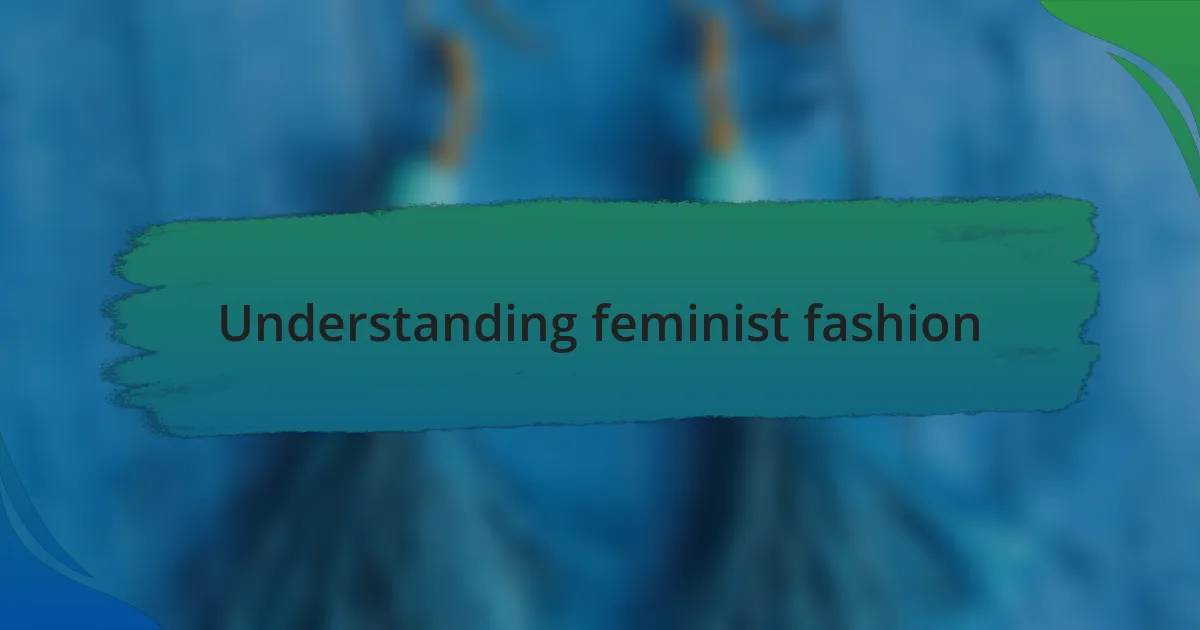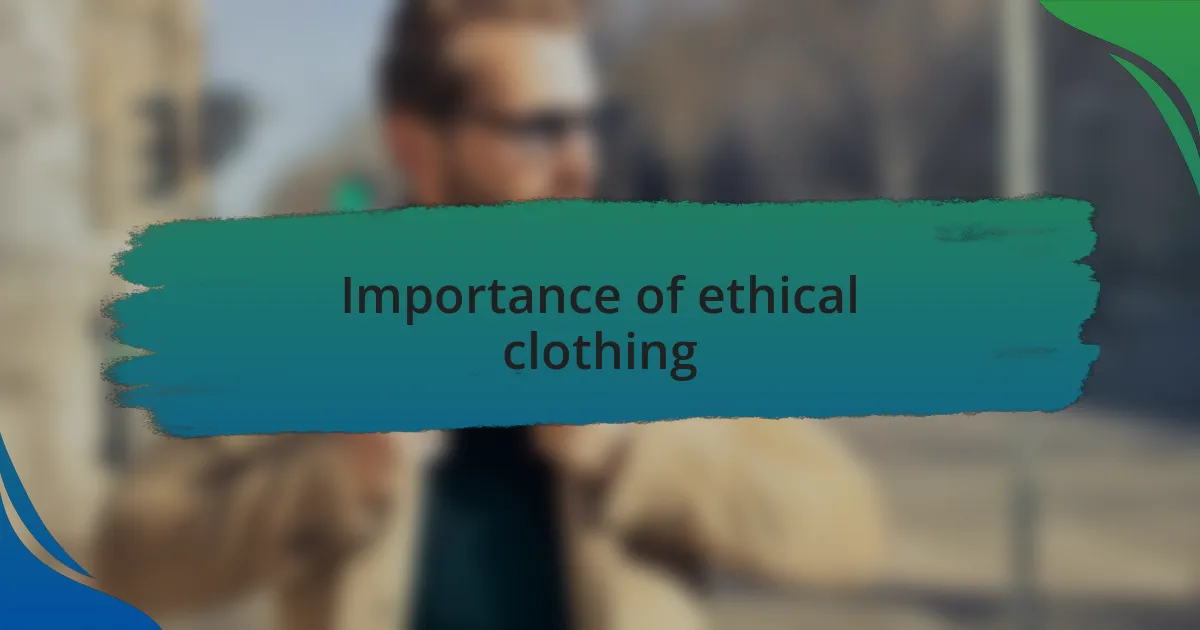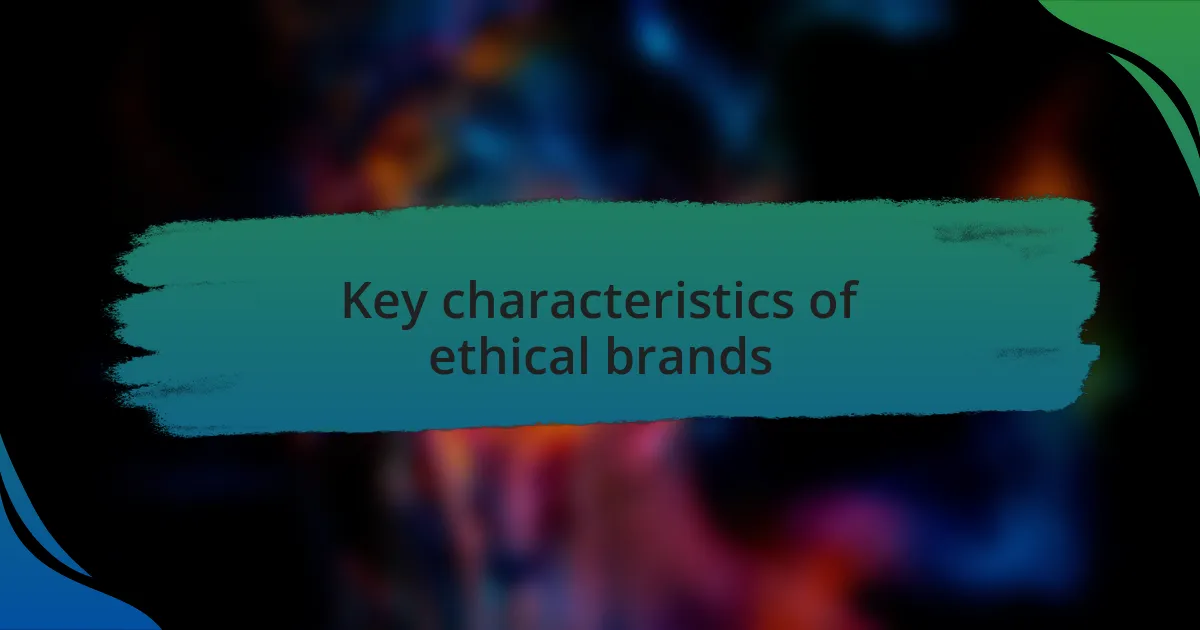Key takeaways:
- Feminist fashion is an expression of identity and values that supports gender equality and sustainable practices.
- Ethical clothing prioritizes transparency and accountability, fostering a culture that uplifts communities and respects artisans’ rights.
- Key characteristics of ethical brands include commitment to sustainable materials, fair labor practices, and the storytelling behind their products.

Understanding feminist fashion
Feminist fashion goes beyond just clothing; it’s a powerful expression of identity and values. When I first encountered brands that championed gender equality, I felt an exhilarating sense of empowerment. The thought struck me: How can fashion not only reflect who we are but also advocate for the rights of women everywhere?
One of the most impactful aspects of feminist fashion is its commitment to sustainable practices and ethical production. I remember a moment when I discovered a brand that not only sourced materials responsibly but also empowered female artisans in developing countries. This realization made me question my purchasing habits—was I just buying clothes, or was I supporting a movement?
It’s essential to recognize that feminist fashion invites us to redefine beauty standards and challenge societal norms. As I connected with like-minded individuals, the conversations often sparked a collective aspiration for change. Isn’t it fascinating how our personal choices in fashion can weave together a broader narrative of empowerment and social justice?

Importance of ethical clothing
Ethical clothing is crucial because it ensures that our fashion choices don’t exploit vulnerable communities. I still vividly recall the first time I learned about the harsh realities faced by garment workers. It hit me hard; how could I justify wearing something made under such conditions? This awareness transformed not just my shopping habits but also my relationship with the clothes I wear.
When I invest in ethical brands, I am not just buying a product; I’m prioritizing people and the planet. Recently, I purchased a dress from a label dedicated to fair trade practices. Every time I wear it, I feel a deep connection to the artisans who crafted it, knowing that my choice supports their livelihood. It’s a small act, but it feels significant. Doesn’t it resonate with you too, that our purchases can help uplift others rather than contribute to their struggles?
Moreover, the importance of ethical clothing extends beyond individual consumption. It’s about fostering a culture that values transparency and accountability in the fashion industry. I find it empowering when brands openly share their production processes and the stories behind their garments. It lets me feel like I’m part of a community advocating for change, one stitch at a time. How powerful is it to realize that our collective choices can reshape the industry for the better?

Key characteristics of ethical brands
One of the defining characteristics of ethical brands is their commitment to transparency. I remember when I first visited a local ethical store and saw tags that detailed the journey of the products—from the sourcing of materials to the conditions under which they were produced. It made me appreciate not just the clothing but the story behind it. Don’t you think knowing where your clothes come from adds a layer of meaning to your wardrobe?
Additionally, ethical brands often prioritize sustainable materials. For instance, I recently switched to a brand that uses organic cotton and recycled fabrics exclusively. The feel of the garments is just different; they lack the harsh chemicals found in conventional fabrics, and that tactile difference resonates with me. Isn’t it incredible how a simple fabric choice can reflect a brand’s values and commitment to the environment?
Another key characteristic is their dedication to fair labor practices. I once attended a workshop led by a founder who shared her experience with artisans in developing countries, ensuring they receive fair wages and safe working conditions. This commitment transformed my perspective; it’s not just about wearing trendy clothes, but about making a positive impact. How motivating is it to know our fashion choices can play a role in supporting ethical labor practices around the globe?